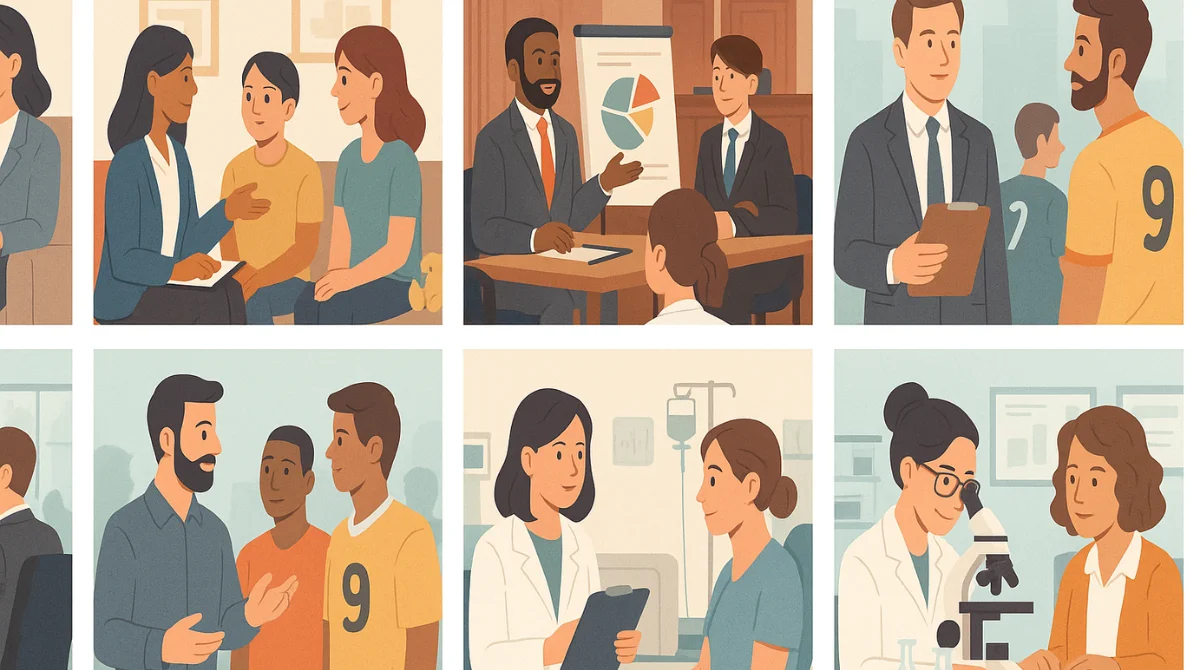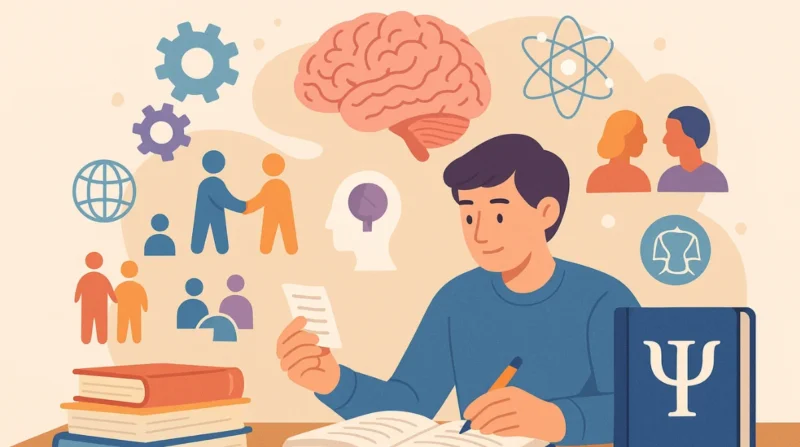Table of Contents
- Understanding Social Sciences
- Social Psychology: A Clear Example
- Psychology’s Place Among Social Sciences
- Psychology’s Scientific Methods
- The Dual Nature of Psychology
- Psychology’s Focus on Human Behavior
- Addressing Social Issues
- Everyday Uses of Psychology in Real Life
- What You Need: Psychology Degrees and Education Paths
- Careers You Can Pursue with Psychology
- Conclusion
Psychology is the study of the human mind and behavior. It explores how we think, feel, and act. But is psychology a social science? To answer this, we need to understand what social sciences are and how psychology aligns with them.
Understanding Social Sciences
Social sciences focus on human society and social relationships. They include disciplines like sociology, anthropology, economics, and political science. These fields study how people interact, how societies function, and how cultures develop. They often use both qualitative and quantitative research methods to gather data and analyze human behavior.
Social Psychology: A Clear Example
Social psychology is a branch of psychology that examines how individuals’ thoughts, feelings, and behaviors are influenced by the presence of others. It studies topics like group dynamics, social perception, and interpersonal relationships. This field clearly demonstrates psychology’s role as a social science, as it directly investigates social interactions and their effects on individuals.
Psychology’s Place Among Social Sciences
Psychology shares many characteristics with social sciences:
- Focus on Human Behavior: Psychology examines how individuals think, feel, and behave, both individually and in groups. This aligns with the social sciences’ interest in human behavior and social interactions.
- Research Methods: Psychologists use various research methods common in social sciences, such as surveys, interviews, observations, and case studies. These methods help gather data on human thoughts, emotions, and behaviors.
- Interdisciplinary Approach: Psychology often overlaps with other social sciences. For example, social psychology examines how individuals are influenced by social interactions, which connects closely with sociology. Developmental psychology studies human growth and development, intersecting with anthropology and education.
- Application to Social Issues: Psychology addresses societal issues like mental health, addiction, and social inequality. By understanding human behavior, psychologists contribute to solutions for these problems.
Psychology’s Scientific Methods
Even though psychology is mainly considered a social science, it also uses scientific methods that are commonly found in natural sciences like biology or chemistry. This makes psychology both rigorous and reliable when it comes to understanding human behavior. Let’s break down how these scientific methods work in psychology:
1. Empirical Research
Psychologists rely heavily on empirical research, which means they study behavior through observation, experiments, and real-world testing. They don’t just guess or make assumptions. Instead, they form hypotheses, educated guesses about how people behave and then test them using controlled studies. For example, if a psychologist wants to understand how sleep affects memory, they might conduct an experiment where one group of people gets plenty of sleep and another group doesn’t, and then compare their performance on memory tests. This process ensures that conclusions are based on evidence, not opinions.
2. Quantitative Analysis
After collecting data, psychologists use quantitative analysis in simple terms, they use math and statistics to make sense of what they found. This helps them identify patterns and trends in behavior. For instance, by using surveys and analyzing the results with statistical tools, a psychologist might discover that people who exercise regularly report lower levels of stress. These kinds of findings are important because they can be tested again and applied in real-life settings.
3. Biological Connections
Some areas of psychology go even deeper by exploring the biological basis of behavior. This includes fields like neuropsychology and biopsychology, where psychologists study how the brain, nervous system, hormones, and genetics influence how we think and act. For example, scientists might look at brain scans to see what areas are active when someone is feeling fear or making a decision. These studies connect psychology to biology and neuroscience, giving us a more complete understanding of human behavior.
The Dual Nature of Psychology
Psychology’s use of both social science and natural science methods gives it a unique position:
- Social Science Aspects: Focus on human behavior, social interactions, and cultural influences.
- Natural Science Aspects: Use of experiments, biological studies, and quantitative analysis.
This dual nature allows psychology to provide a comprehensive understanding of human behavior from multiple perspectives.
Psychology’s Focus on Human Behavior
At its core, psychology aims to understand human behavior. It explores how people develop, learn, and interact with others. Psychology also examines how cultural, social, and environmental factors influence behavior. This focus aligns with the goals of social sciences, which seek to understand the complexities of human societies.
Addressing Social Issues
Psychology often addresses societal issues such as mental health, addiction, and social inequality. By studying these problems, psychologists contribute to developing interventions and policies aimed at improving societal well-being. This application of psychological knowledge to real-world issues further solidifies its place within the social sciences.
Everyday Uses of Psychology in Real Life
Psychology is not just something studied in classrooms or used by therapists. People use psychology in their everyday lives, often without even realizing it. When you try to understand why a friend is upset or how to calm yourself down before a big event, you’re applying psychological principles. Parents use psychology when they motivate their children with rewards or discipline. Teachers rely on psychological strategies to keep students engaged and help them learn better.
In the workplace, managers use psychology to build teamwork, boost employee motivation, and solve conflicts. Advertisers use psychological techniques to influence consumer behavior, like choosing colors or words that appeal to emotions. Even when making a schedule or setting goals, people use basic psychological ideas like time management, habit formation, and self-motivation.
Understanding emotions, improving communication, and handling stress are all rooted in psychology. By learning how the mind works and how behavior is shaped, people can make better decisions, build stronger relationships, and improve their overall quality of life. Psychology gives us tools to handle everyday challenges more effectively.
What You Need: Psychology Degrees and Education Paths
To start a career in psychology, having the right education is very important. A Psychology Degree is the foundation you need, and the level of degree required can vary depending on the type of job you’re aiming for. Here’s a simple breakdown of the common degrees in psychology and what they can lead to:
1. Associate Degree in Psychology
This is a 2-year program usually offered at community colleges. It gives a basic understanding of psychology and can lead to entry-level jobs like a psychiatric technician or teacher’s aide. Many students use this as a first step before transferring to a university.
2. Bachelor’s Degree in Psychology (BA or BS)
A 4-year degree that teaches the core concepts of psychology, including development, behavior, research methods, and mental health. With a bachelor’s degree, you can work in areas like human resources, sales, social services, or as a research assistant. However, to become a licensed psychologist or counselor, you’ll need further education.
3. Master’s Degree in Psychology (MA or MS)
This degree usually takes 2 more years after a bachelor’s. It allows you to specialize in areas like counseling, school psychology, or industrial-organizational psychology. In some fields, a master’s is enough to get licensed and start practicing, especially in counseling or therapy roles.
4. Doctoral Degrees (PhD or PsyD)
These are the highest levels of education in psychology. A PhD in Psychology focuses more on research and teaching, while a PsyD focuses on clinical work and therapy. Both usually take 4–7 years to complete after a bachelor’s or master’s degree. With a doctoral degree, you can become a licensed psychologist, open your own clinic, work in hospitals, teach at universities, or conduct advanced research.
5. Additional Licenses and Certifications
In many countries, including the U.S., you must get a license to work as a psychologist or counselor. This often involves passing a state exam and completing a certain number of supervised hours. Other roles may require special certifications based on the area of work.
6. Online vs. Traditional Education
Nowadays, many universities offer psychology programs online. While online degrees can be more flexible, make sure the program is accredited and meets the requirements for licensing if that’s your goal.
Careers You Can Pursue with Psychology

Studying psychology opens the door to a wide range of careers. Because psychology is about understanding human behavior and mental processes, it’s useful in many fields. Here are some common jobs related to psychology, along with what they involve:
1. Clinical Psychologist
Clinical psychologists work with people who have mental health problems like anxiety, depression, or trauma. They use therapy and assessments to help people manage and improve their mental well-being.
2. Counselor or Therapist
Counselors support individuals, couples, or groups by listening and guiding them through emotional and personal challenges. This could be in schools, clinics, private practices, or hospitals.
3. School Psychologist
These professionals work in educational settings to help students succeed academically and socially. They may test students for learning issues and offer strategies to improve classroom behavior.
4. Industrial-Organizational (I-O) Psychologist
I-O psychologists apply psychology to the workplace. They study employee behavior, help improve work environments, and develop training programs to make businesses run better.
5. Forensic Psychologist
Forensic psychologists work at the intersection of psychology and law. They may assess criminals, work with lawyers on cases, or provide expert opinions in court.
6. Sports Psychologist
Sports psychologists help athletes improve their performance and mental focus. They deal with issues like pressure, confidence, and teamwork.
7. Health Psychologist
Health psychologists study how mental, emotional, and social factors affect physical health. They often work in hospitals or public health settings to promote healthier lifestyles.
8. Researcher or Academic
Many psychologists work in universities or research centers. They study topics like memory, development, or social behavior to better understand the human mind and improve treatments or public policies.
9. Human Resources (HR) Specialist
Though not always labeled as a psychology job, HR roles benefit greatly from psychology. Understanding motivation, communication, and conflict resolution is key in managing people effectively.
10. Marketing and Consumer Behavior Analyst
People in advertising and marketing often use psychology to understand how people make buying decisions and how to influence those choices.
Conclusion
Psychology is clearly a social science, as it focuses on human behavior, thoughts, and social interactions. Like other social sciences, it uses research methods such as surveys, observations, and interviews to understand people in their cultural and social settings. However, psychology also applies scientific techniques like experiments, data analysis, and biological research, making it deeply connected to natural sciences. This dual approach gives psychology a unique strength. It not only explains what people do but also explores why they do it both socially and biologically. Because of this, psychology stands out as a powerful and flexible field that helps us understand the complex nature of human life from different perspectives, blending science with the study of society.









